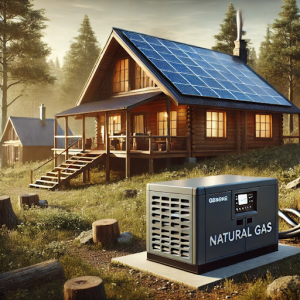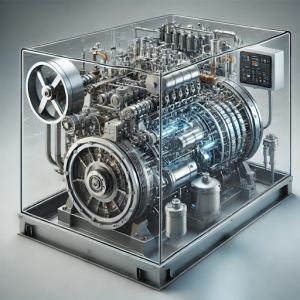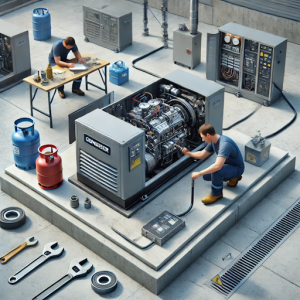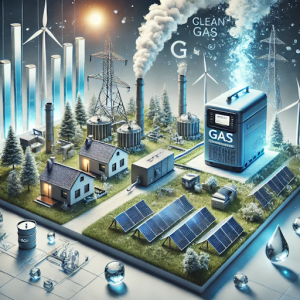Discover the Transformative Advantages of Natural Gas Generators for Your Off-Grid Lifestyle
Natural gas generators emerge as a top-tier solution for individuals seeking a dependable power source for remote homes or cabins. To successfully embark on your off-grid adventure, it is essential to comprehend the various power generation options available. The unique benefits of natural gas generators—such as their reliability, affordability, and environmentally friendly characteristics—make them an appealing choice for those who are passionate about sustainable living and maximizing energy efficiency in an off-grid setting.
In today’s technology-driven landscape, the allure of off-grid living has gained substantial traction among diverse communities. Whether driven by a desire for sustainability, self-sufficiency, or the pursuit of a simpler way of life, detaching from conventional power grids can be deeply rewarding. Off-grid power solutions empower individuals to harness energy from renewable and alternative sources, ensuring a comfortable living experience free from reliance on standard electricity networks.
Equipping yourself with the right knowledge and preparations can help you effectively integrate a natural gas generator into your off-grid lifestyle, ensuring that your essential energy needs are consistently met. This article will delve into the myriad benefits of natural gas generators, explain their operational principles, and highlight critical considerations for selecting and installing them as part of your off-grid energy strategy.
 Essential Knowledge for Enhancing Your Off-Grid Energy Solutions
Essential Knowledge for Enhancing Your Off-Grid Energy Solutions
- Embracing off-grid power solutions liberates you from conventional energy systems, making them invaluable for remote living or during unforeseen power outages.
- Natural gas generators deliver consistent and efficient energy production, with significantly lower emissions compared to diesel or gasoline alternatives.
- These generators function by combusting natural gas to create mechanical energy, which is then converted into electrical energy through a generator system.
- When selecting a natural gas generator, it is vital to consider factors such as power output, fuel efficiency, and maintenance requirements to ensure optimal functionality.
- Proper installation and regular maintenance are crucial for the safe and efficient operation of your natural gas generator.
Uncover the Remarkable Benefits of Natural Gas Generators for Energy Production
The exceptional reliability of natural gas generators is one of their standout features. By choosing a natural gas generator for your off-grid energy needs, you can expect a consistent power supply tailored to your specific requirements. Unlike solar panels or wind turbines, which can be significantly impacted by climatic conditions, natural gas generators provide a stable energy output that remains unaffected by external factors.
This reliability proves essential for individuals relying on electricity for critical functions, including heating, refrigeration, and operating medical devices. The assurance that your generator will provide power when you need it most offers considerable peace of mind. Alongside their reliability, natural gas generators also present notable cost savings.
While the initial investment might be higher than that of some alternative off-grid solutions, the potential long-term savings can be substantial. Natural gas tends to be more economical than gasoline or diesel, leading to reduced operational costs over time. Furthermore, natural gas generators generally require less maintenance than their counterparts, allowing you to save both time and money while enjoying a reliable energy supply.
 Understanding How Natural Gas Generators Function
Understanding How Natural Gas Generators Function
Natural gas generators work by converting the chemical energy contained in natural gas into electrical energy through a combustion process. Upon starting, the generator mixes natural gas with air and ignites this mixture within the engine’s combustion chamber. This ignition produces high-pressure gases that propel the engine’s pistons, ultimately rotating the generator’s rotor to produce electricity.
This operational method is particularly noteworthy for its efficiency, offering a cleaner alternative compared to other fossil fuel options. A crucial component of a natural gas generator is its fuel system, usually equipped with a regulator that manages gas flow to ensure peak performance. Modern natural gas generators often feature advanced capabilities such as automatic start/stop functions and remote monitoring systems.
These innovations greatly enhance user convenience, enabling more effective management of your power supply and simplifying your off-grid living experience.
Key Considerations When Selecting Your Natural Gas Generator
| Consideration | Description |
|---|---|
| Power Output | Identify the generator’s required power output based on the appliances and equipment you intend to power. |
| Fuel Type | Opt for natural gas as your fuel choice due to its clean-burning and economical characteristics. |
| Size and Portability | Choose a generator size and portability that aligns with your available space and mobility requirements. |
| Noise Level | Evaluate the generator’s noise output to ensure it meets acceptable standards for your living environment. |
| Start-up Mechanism | Choose between manual or automatic start-up options based on your convenience and frequency of use. |
When selecting a natural gas generator for your off-grid configuration, several critical aspects must be evaluated. Primarily, assess your power requirements. Calculate the total wattage needed to support your essential appliances and devices, ensuring that the generator you choose can handle the load efficiently.
It is advisable to select a generator with a slightly higher capacity than your calculated needs to accommodate any sudden spikes in power demand. Another important factor to consider is the generator’s portability and installation requirements. If you plan to move your generator frequently or use it in multiple locations, look for a lightweight and easily transportable model.
Additionally, think about whether you prefer a stationary setup or a portable unit that can be conveniently deployed as needed. Finally, consider the generator’s noise level; quieter models can significantly improve your off-grid experience by minimizing disturbances and maintaining the tranquility of your natural surroundings.
 Best Practices for Successful Installation and Maintenance of Natural Gas Generators
Best Practices for Successful Installation and Maintenance of Natural Gas Generators
The installation of a natural gas generator requires careful planning and execution to ensure both safety and effectiveness. Begin by selecting an appropriate location for your generator, ensuring compliance with local regulations and safety standards. This location should ideally feature good ventilation and sufficient distance from flammable materials.
You may also need to install a concrete pad or platform to stabilize the generator and protect it from moisture damage. Once you’ve determined the ideal site, connect the generator to your natural gas supply line. If you are inexperienced with gas line installations, it’s advisable to seek professional assistance to ensure adherence to safety standards.
After establishing the fuel connection, set up the necessary electrical connections to integrate the generator with your home’s electrical system. Regular maintenance is crucial to ensure your generator operates smoothly, which includes routine checks of oil levels, air filter replacements, and spark plug inspections to maintain optimal performance.
Cost Analysis: Comparing Natural Gas Generators with Other Off-Grid Energy Solutions
When assessing the costs associated with off-grid energy solutions, it is essential to conduct a thorough comparison between natural gas generators and alternative options such as solar panels and diesel generators. While solar energy systems are praised for their renewable qualities, they typically require a significant upfront investment in panels, batteries, and inverters. Moreover, solar systems often struggle to provide adequate power during cloudy days or at night unless sufficient battery storage is available.
In contrast, diesel generators are recognized for their reliability, but they often incur higher fuel costs and more frequent maintenance compared to natural gas generators. Given the volatility in diesel fuel pricing, natural gas tends to offer a more stable and frequently lower-cost option in many regions. A long-term cost analysis reveals that natural gas generators often provide a more economical solution for those pursuing an off-grid lifestyle.
 Analyzing the Environmental Impact of Natural Gas Generators in Off-Grid Living
Analyzing the Environmental Impact of Natural Gas Generators in Off-Grid Living
As you evaluate your off-grid energy options, it is crucial to consider their environmental impact. Natural gas is often viewed as a cleaner alternative to other fossil fuels like coal or oil, due to its lower carbon emissions during combustion. By choosing a natural gas generator, you can significantly reduce your carbon footprint while enjoying reliable energy for your off-grid lifestyle.
However, it is important to recognize that natural gas remains a fossil fuel, and its extraction can lead to environmental challenges. Methane leaks during extraction and transportation pose significant greenhouse gas concerns. To address these issues, prioritize sourcing natural gas from reputable suppliers who are committed to sustainable practices.
Furthermore, incorporating renewable energy sources alongside your natural gas generator can further demonstrate your commitment to environmental stewardship and responsible energy use.
Inspiring Real-World Examples of Off-Grid Power Solutions with Natural Gas Generators
Examining real-life case studies can provide valuable insights into how natural gas generators have been effectively utilized in off-grid living scenarios. For instance, numerous rural homeowners have transitioned to using natural gas generators as their primary energy source after experiencing frequent outages from traditional utility services. The implementation of these generators has empowered them to achieve energy independence while ensuring a stable electricity supply for heating, cooling, and essential appliances.
Another compelling example involves remote cabins that depend on natural gas generators for seasonal use. Due to their isolated locations, these cabins often lack access to conventional power sources. Natural gas generators enable cabin owners to enjoy modern conveniences such as refrigeration and lighting without sacrificing their connection to the natural environment.
These success stories illustrate how natural gas generators can effectively support off-grid living, providing comfort and reliability. As you embark on your journey toward off-grid living, consider the extensive benefits that natural gas generators offer. From their consistent reliability and cost-effectiveness to their relatively low environmental impact, these generators can play a vital role in achieving energy independence.
By carefully selecting the right model for your specific needs and adhering to proper installation and maintenance practices, you can successfully transition to an off-grid lifestyle powered by natural gas.
Frequently Asked Questions About Natural Gas Generators
What characterizes a natural gas generator for off-grid applications?
A natural gas generator designed for off-grid living is a power generation system that utilizes natural gas as its fuel source to generate electricity in remote areas where access to the main power grid is limited or unavailable.
How does a natural gas generator function for off-grid use?
A natural gas generator intended for off-grid applications operates by combusting natural gas within an internal combustion engine. This process generates mechanical energy, which is then converted into electrical energy via a generator. The electricity produced can power various appliances, equipment, and lighting in off-grid settings.
What are the main benefits of utilizing a natural gas generator in off-grid living?
Key benefits of using a natural gas generator for off-grid living include:
– Lower fuel costs compared to diesel or gasoline generators
– Cleaner combustion resulting in lower emissions
– Continuous fuel supply sourced from natural gas pipelines
– Reduced maintenance requirements compared to other fuel types
What factors should be considered when using a natural gas generator for off-grid applications?
Important factors to consider when utilizing a natural gas generator in off-grid scenarios include:
– Availability of natural gas supply in your area
– Initial installation and equipment costs
– Regular maintenance and servicing requirements
– Environmental implications and compliance with emissions regulations
Is the use of a natural gas generator off-grid viable for residential and commercial purposes?
Natural gas generators designed for off-grid use are suitable for both residential and commercial applications. They are commonly used in remote homes, cabins, farms, and small businesses that lack access to the main power grid.
The post Natural Gas Generators for Off-Grid Power Solutions appeared first on Survival Bite.
The Article Natural Gas Generators: Your Off-Grid Power Solution Was Found On https://limitsofstrategy.com


The exploration of natural gas generators for off-grid living is genuinely fascinating, especially as more individuals and families choose to redefine their relationships with energy and the environment. The promise of reliability and efficiency that these generators offer can indeed serve as a cornerstone for anyone venturing into a more sustainable lifestyle.
I appreciate your insights on natural gas generators, particularly in the context of off-grid living. As someone who has explored various power sources in remote settings, I resonate with the notion of sustainability driving our choices. Natural gas offers a balance of reliability and environmental friendliness that can be vital for those who wish to minimize their carbon footprint while remaining connected to essential power needs.